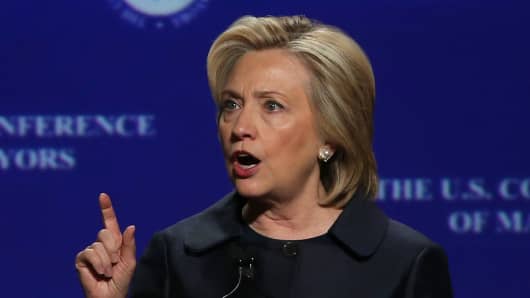The idea of a post-racial society does not exist. When we can acknowledge this truth, we can accept the reality that, yes, the country elected Barack Obama, the first black president, but instead of healing a rift, the issues of race have only been magnified.
Read More Obama: Affordable Care Act is 'here to stay'
So, when Hillary Clinton, spoke at the 83rd annual U.S. Conference of Mayors, after the tragic massacre of nine Black Americans at Mother Emanuel African Methodist Episcopal church in South Carolina, and became the first 2016 presidential candidate to speak candidly about race relations in America, I took notice.
"Let's be honest: For a lot of well-meaning, open-minded white people, the sight of a young, black man in a hoodie still evokes a twinge of fear," said Clinton. "And news reports about poverty and crime and discrimination evoke sympathy, even empathy, but too rarely do they spur us to action or prompt us to question our own assumptions and privilege."
And just like that, another seat was pulled up to the table.
Mrs. Clinton went on to say, "We can't hide from any of these hard truths about race and justice in America. We have to name them and own them and then change them."
This is the time for all the Democratic and Republican presidential candidates to speak to the issues of race. This is courage in leadership.
If the candidates are forced to state their positions on race in America, then voters will understand what will inform their policy decisions in addressing issues affecting African Americans, including higher rates of incarceration than whites, longer sentences for the same crimes as whites and far higher rates of unemployment compared to whites.
Read MoreWhy Republicans need to dump Trump
Yet another seat was pulled up to the table after the tragic events in South Carolina. In reference to the debate over the Confederate flag that hangs over the South Carolina State Capital, Republican State Sen. Paul Thurmond, son of longtime U.S. Senator and segregationist Strom Thurmond spoke out, saying "It is time to acknowledge our past, atone for our sins, and work for a better future ... I am proud to take a stand and no longer be silent. We must take down the Confederate flag and we must take it down now. But if we stop there, we have cheated ourselves out of an opportunity to start a different conversation about healing in our state."
If Thurmond has the courage to speak out against racism, in part against the legacy of his own father, why haven't all the presidential candidates from both sides of the aisle joined in on the conversation? When we as a nation can see race through the lens of policy and policy through the lens of race, then the issue of a flag no longer becomes the focal point but rather jobs and education.
Read More Hillary's campaign stumbles on trade
A 2013 Census Bureau report showed a higher percentage of African-Americans than whites voted in the 2012 presidential election for the first time. With more than 66 percent of eligible black voters to 64.1 percent of whites voting, these are numbers and a voting block too important to ignore. Too much is at stake for a community that is feeling the pain and frustration of decades of failed policies, accelerating police brutality and a nation that has yet to properly place race into context.
I look forward to the day when I can sit at the table knowing we have a shared responsibility of building an inclusive nation. That's the world I want my son to grow up in.
Commentary by Mike Muse, co-founder of Muse Recordings. Muse has served on President Barack Obama's National Finance Committee as well as finance committees of Sens. Cory Booker and Kirsten Gillibrand and Mayor Bill de Blasio. He is currently serving on the Democratic National Finance Committee and Hillary Clinton's Finance Committee. He was recently named a United States Small Business Administration's My Brother's Keeper, Millennial Entrepreneurial Champion and was appointed by New York City Mayor, Bill de Blasio, to serve on the Board of Advisors for the Mayors Fund to Advance New York City. Follow him on Twitter @IamMikeMuse.


